You can make Windows stop creating System Volume Information folder on removable drives every time you connect your flash drive to the computer. If you have such a folder on your removable drive, it means that its file system is NTFS. If File Explorer shows it, you must have enabled the 'show system files' in folder options.
Advertisеment
The System Volume Information folder is located in the root of the drive. It contains important system data like restore points, search index database, shadow copies, and a variety of other files.
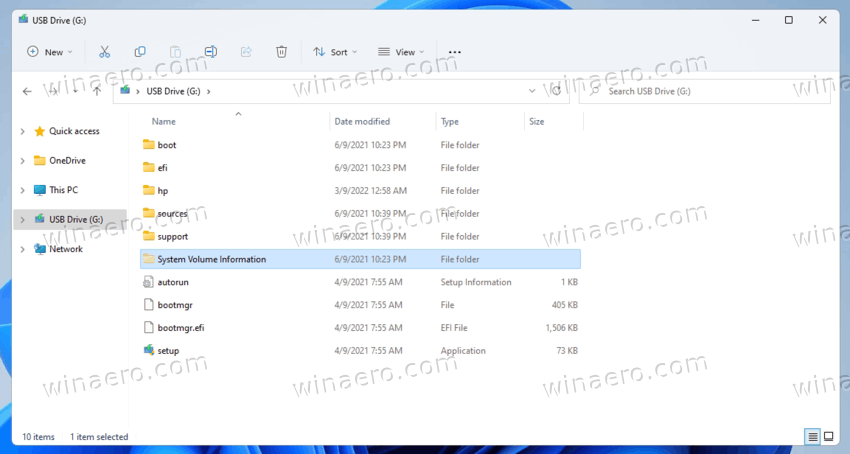
By default, NTFS permissions set of that folder prevent the user from deleting it. That requires changing them or running some app like command prompt as TrustedInstaller. However, if the drive has the FAT32 or exFAT file system, the user can easily remove it.
If you remove the System Volume Information folder from your flash drive, Windows will quickly recreate it. It will contain at least two files.
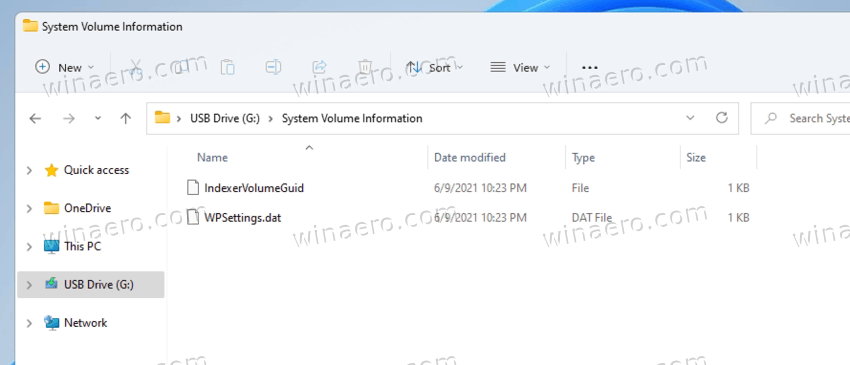
- The IndexerVolumeGuid file that will be created by the Windows Search service (WSearch).
- The WPSettings.dat file that is generated by the Storage Service (StorSvc).
So, you need to disable the creation of the System Volume Information folder on removable drives before you delete it. This will prevent Windows from instant recreation of the folder.
Disable the System Volume Information Folder for Removable Drives
- Press Win + R and enter
regeditinto the Run box open the Registry editor. - Navigate to the
HKEY_LOCAL_MACHINE\SOFTWARE\Policies\Microsoft\Windows
key. - Right-click Windows and select New > Key from the context menu. Name the new key Windows Search.
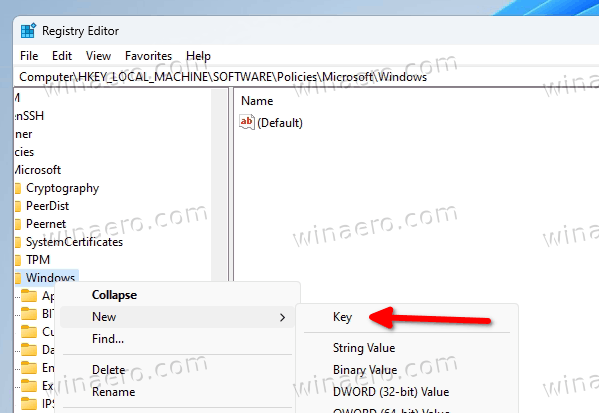
- Finally, to the right of the Windows Search key, create a new 32-bit DWORD value named DisableRemovableDriveIndexing and set it to 1.
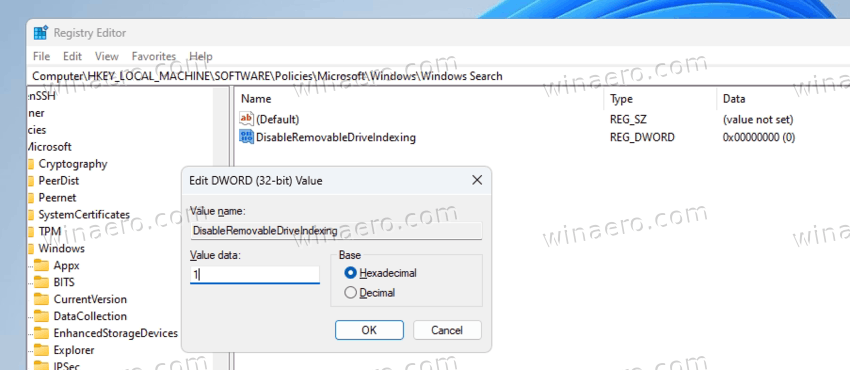
- Now, press Win + R and type
services.mscin the Run dialog to open the Services snap-in.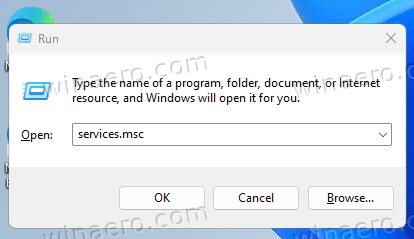
- Find the "Storage Service", and double-click it. Select Disabled for the startup type.
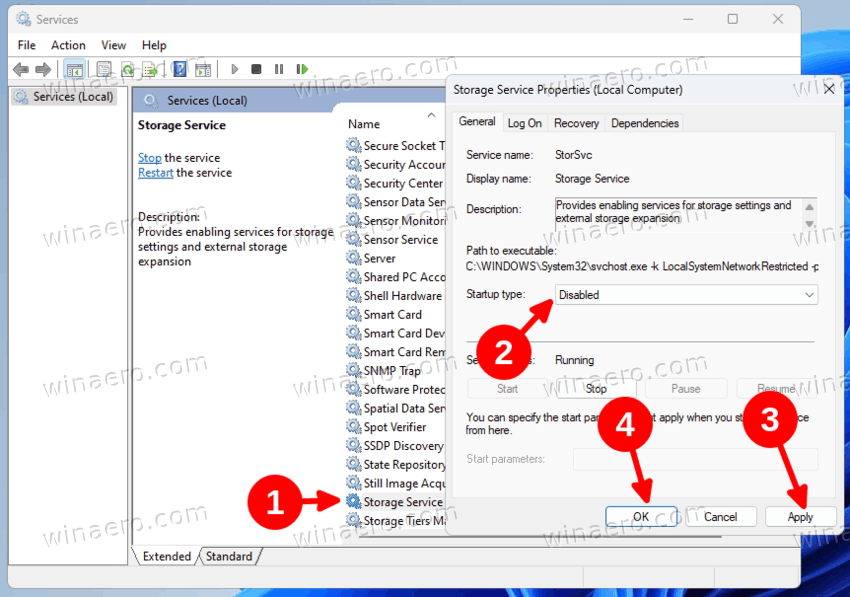
- Restart the operating system.
Done. From now, Windows won't create the System Volume Information folder on on removable drives. You can now remove that folder from your USB stick.
Tip: If you are running Windows Pro edition or above, you can use a group policy instead of the Registry tweak. Run gpedit.msc, navigate to "Computer Configuration\ Administrative Templates\ Windows Components\ Search", and enable the policy "Do not allow locations on removable drives to be added to libraries".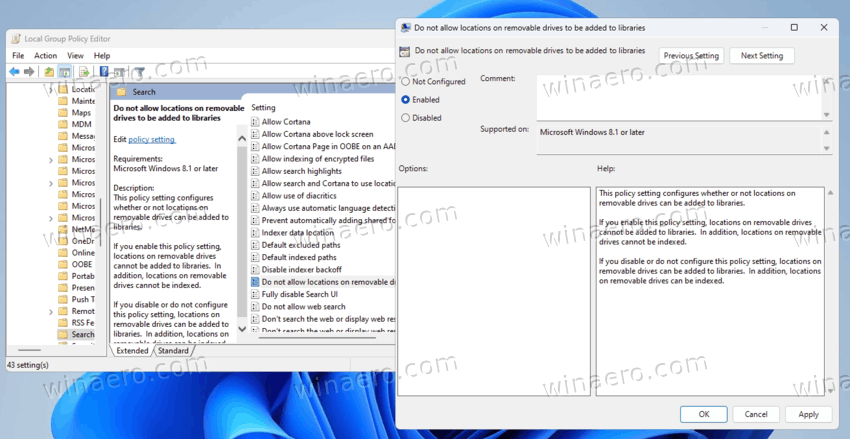
Remove the System Volume Information folder
Before removing, please keep in mind to the following things.
- Removing this folder is not mandatory. With default File Explorer settings you will never seen it; unless you make it show protected system files.
- If your flash drive doesn't contain anything important, you can simply format it. It is much faster than removing the folder using any method.
- Since you have already disabled the System Volume Information folder for removable drives, it won't reappear on you computer. But if you connect your flash drive to some other computer, Windows will create it again.
So, here's how to delete the folder.
Method 1
To remove System Volume Information from a removable drive, do the following.
- Right-click the folder and select Properties from the menu.
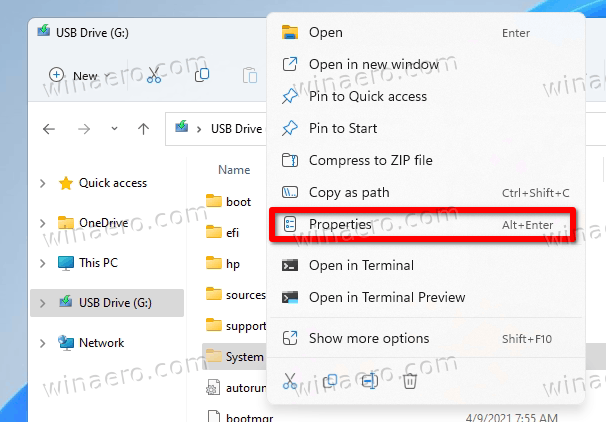
- Switch to the Security tab, and click on the Advanced button.
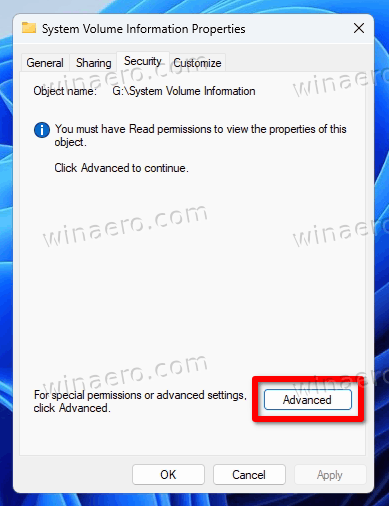
- Click on the Change link next to the Owner value.
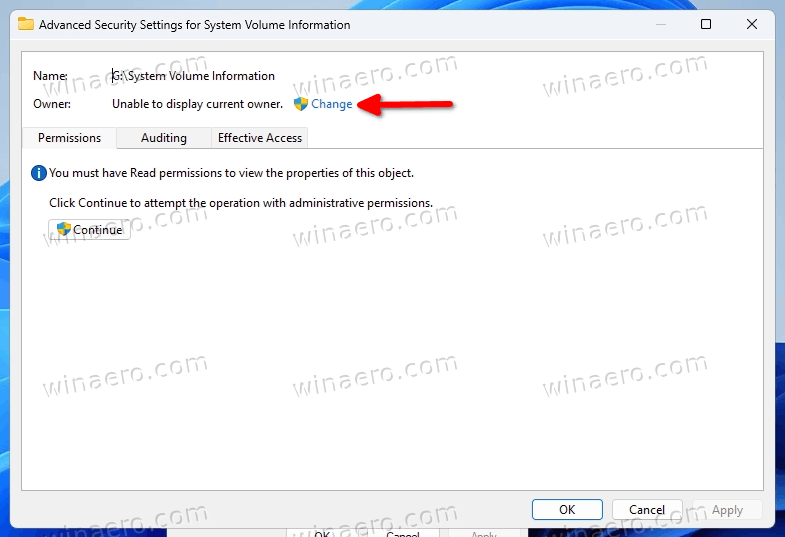
- Now, click the Advanced button, click on Find Now and select your user account from the list, then click OK.
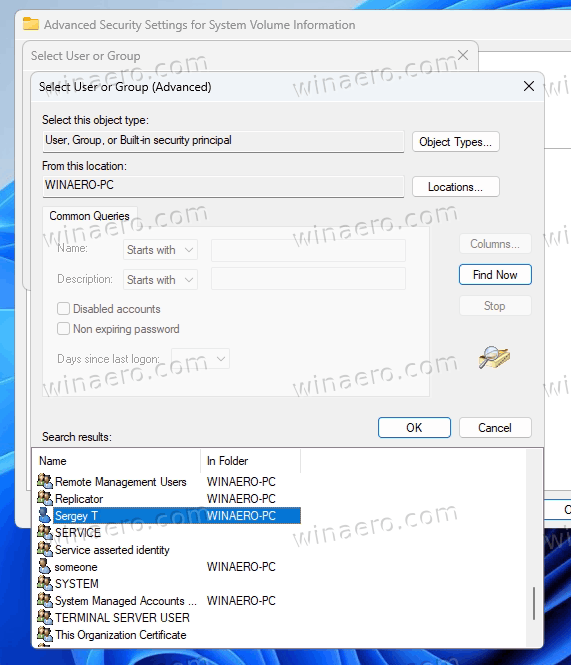
- Click OK again, and check the Replace the owner for objects and subcontainers.
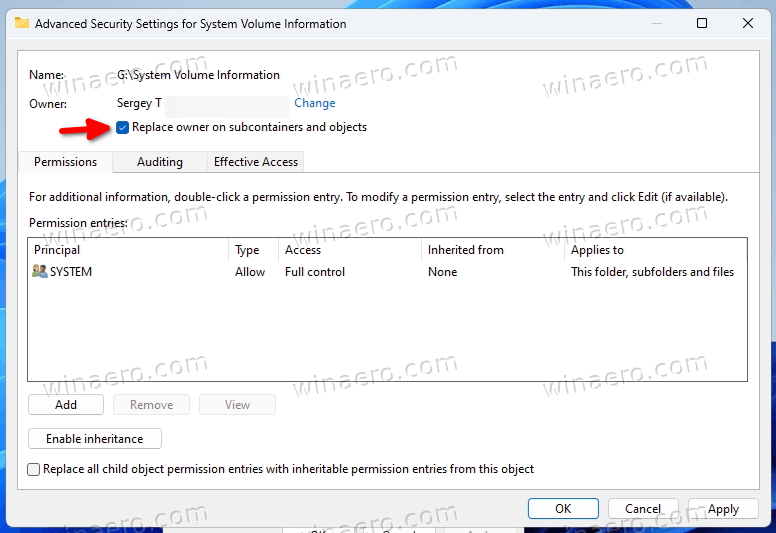
- Press the OK button in the advanced properties dialog, and confirm the replacement in the Windows Security prompt.
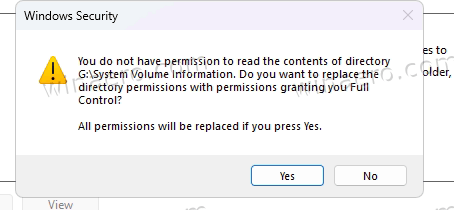
- Open a command prompt as Administrator, and type the following command:
rd "G:\system volume information" /s /q. Replace G: with the drive letter assigned to your removable drive.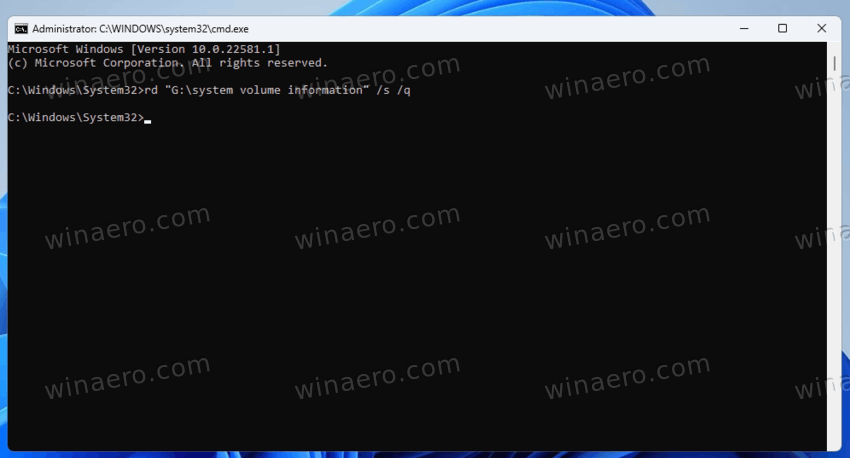
You are done. The System Volume Information directory is now removed.
Method 2
Download some tool like PowerCMD, ExecTI, or Winaero Tweaker. Now, run the Command Prompt app (cmd.exe) as TrustedInstaller. The latter is a hidden built-in account in Windows which is set as the owner for mission-critical files and Registry keys. However, if you execute a program as TrustedInstaller, then you are able to access these protected resources without taking ownership and changing access permissions.
Install and run Winaero Tweaker, then select "Tools > Run as TrustedInstaller". For the command, type cmd.exe.
Finally, in the Command Prompt, type the familiar command rd "e:\system volume information" /s /q. It will remove it directly.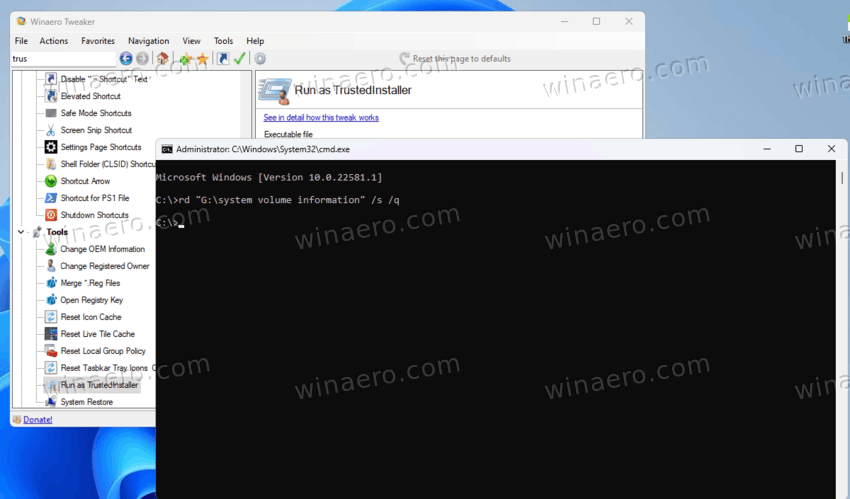
Instead of the cmd.exe app, you can run your favorite file manager app, such as Far or Total Commander, and delete the folder from them.
The Storage Service (StorSvc)
As you may remember, earlier we have disabled the Storage Service to prevent it from creating the WPSettings.dat file. However, this service is important for the operating system, so keeping it always disabled is a bad idea. For example, it is required to install and update apps from the Microsoft Store.
Alternative to disabling the service, you can stop it on demand. E.g. before plugging in your flash disk, stop the service. After you remove the disk from the USB port, you can start it again.
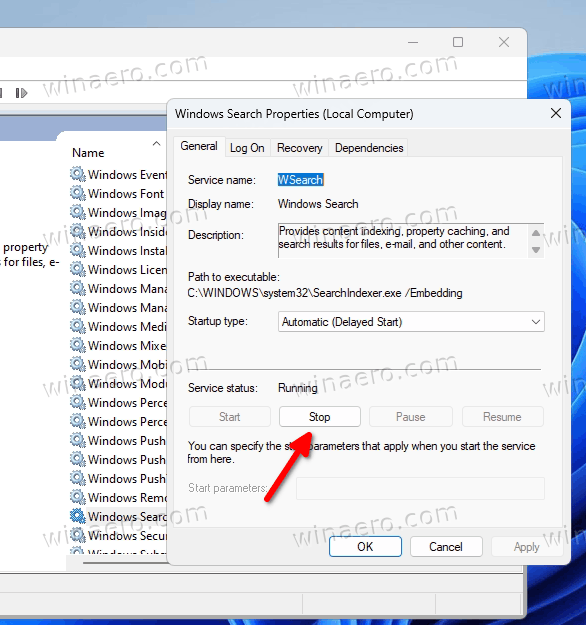
Finally, you can create an empty file named "System Volume Information" without any extension right after removing the eponymous folder. The file will prevent Windows from creating the folder on any computer. But you will end up having an extra file instead of the extra folder in the root of the removable drive.
To create such a file, open a new command prompt and type the following command
echo. > G:\"System Volume Information"
Replace G: with the actual letter of your removable drive.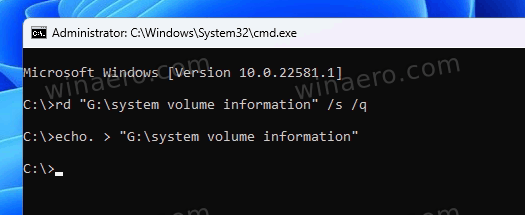
That's it.
Support us
Winaero greatly relies on your support. You can help the site keep bringing you interesting and useful content and software by using these options:

The key itself does not work as I already have had it set on computer and it is still creating files. Stopping service? I am not follow this guide as it might do side effects and really? Who will stop service beofre connecting flash drive and restoring it later. This is not working workaround!
This no longer works on Windows 10. I have done each and every one of these steps and it continues to create that folder. Windows 10 now ignores each of those settings and stopping Windows Search does nothing. Some new method is needed.
On Windows XP THIS FOLDER CAN BE REMOVED